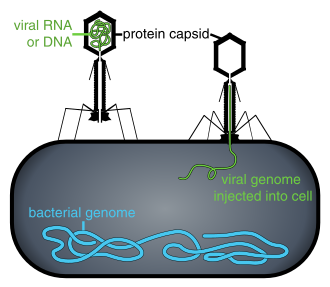Marine viruses



Marine viruses are a diverse group of viruses found in the ocean. They play a critical role in the marine ecosystem, influencing microbial population dynamics, biogeochemical cycles, and food web structures. Marine viruses infect a wide range of hosts, including bacteria, archaea, phytoplankton, and zooplankton, thereby controlling the population and diversity of marine microbial communities.
Overview[edit]
Marine viruses are the most abundant biological entities in the ocean, with estimates of 107 to 1010 viruses per milliliter of seawater. They are found in various marine environments, from coastal waters to the deep sea, and from the surface to the sediment. These viruses are not only abundant but also exhibit a high level of genetic diversity, encompassing a wide range of sizes, shapes, and genome types (both DNA and RNA).
Ecological Impact[edit]
The ecological impact of marine viruses is profound. They are key players in the marine microbial loop, a critical component of the ocean's carbon cycle. By infecting and lysing their hosts, viruses release organic matter and nutrients, which can then be utilized by other microorganisms, promoting primary production and nutrient cycling. This process, known as the "viral shunt," redirects organic matter from higher trophic levels back to the microbial loop, influencing the efficiency of carbon transfer through the marine food web.
Marine viruses also contribute to the genetic diversity and evolution of marine organisms through processes such as horizontal gene transfer. They can carry genes from one host to another, facilitating the adaptation of marine microorganisms to changing environmental conditions.
Research and Methods[edit]
Studying marine viruses involves various techniques, including microscopy for virus counting and visualization, molecular biology methods for genome analysis, and metagenomics for understanding the diversity and function of viral communities. Recent advances in these technologies have significantly enhanced our understanding of marine virology.
Challenges and Future Directions[edit]
One of the main challenges in marine virology is the vast diversity and unknown nature of many marine viruses. A large proportion of viral sequences obtained from marine environments do not match any known viruses, indicating a vast unexplored viral diversity. Future research aims to uncover the roles of these unknown viruses in marine ecosystems, their interactions with hosts, and their impact on global biogeochemical cycles.
Conclusion[edit]
Marine viruses are integral components of the ocean ecosystem, with significant impacts on microbial diversity, nutrient cycling, and the flow of energy through marine food webs. Despite their importance, much remains to be learned about these microscopic entities. Continued research in marine virology is essential for understanding the complexities of marine ecosystems and their responses to environmental changes.

Ad. Transform your life with W8MD's Budget GLP-1 injections from $75


W8MD offers a medical weight loss program to lose weight in Philadelphia. Our physician-supervised medical weight loss provides:
- Weight loss injections in NYC (generic and brand names):
- Zepbound / Mounjaro, Wegovy / Ozempic, Saxenda
- Most insurances accepted or discounted self-pay rates. We will obtain insurance prior authorizations if needed.
- Generic GLP1 weight loss injections from $75 for the starting dose.
- Also offer prescription weight loss medications including Phentermine, Qsymia, Diethylpropion, Contrave etc.
NYC weight loss doctor appointmentsNYC weight loss doctor appointments
Start your NYC weight loss journey today at our NYC medical weight loss and Philadelphia medical weight loss clinics.
- Call 718-946-5500 to lose weight in NYC or for medical weight loss in Philadelphia 215-676-2334.
- Tags:NYC medical weight loss, Philadelphia lose weight Zepbound NYC, Budget GLP1 weight loss injections, Wegovy Philadelphia, Wegovy NYC, Philadelphia medical weight loss, Brookly weight loss and Wegovy NYC
|
WikiMD's Wellness Encyclopedia |
| Let Food Be Thy Medicine Medicine Thy Food - Hippocrates |
Medical Disclaimer: WikiMD is not a substitute for professional medical advice. The information on WikiMD is provided as an information resource only, may be incorrect, outdated or misleading, and is not to be used or relied on for any diagnostic or treatment purposes. Please consult your health care provider before making any healthcare decisions or for guidance about a specific medical condition. WikiMD expressly disclaims responsibility, and shall have no liability, for any damages, loss, injury, or liability whatsoever suffered as a result of your reliance on the information contained in this site. By visiting this site you agree to the foregoing terms and conditions, which may from time to time be changed or supplemented by WikiMD. If you do not agree to the foregoing terms and conditions, you should not enter or use this site. See full disclaimer.
Credits:Most images are courtesy of Wikimedia commons, and templates, categories Wikipedia, licensed under CC BY SA or similar.
Translate this page: - East Asian
中文,
日本,
한국어,
South Asian
हिन्दी,
தமிழ்,
తెలుగు,
Urdu,
ಕನ್ನಡ,
Southeast Asian
Indonesian,
Vietnamese,
Thai,
မြန်မာဘာသာ,
বাংলা
European
español,
Deutsch,
français,
Greek,
português do Brasil,
polski,
română,
русский,
Nederlands,
norsk,
svenska,
suomi,
Italian
Middle Eastern & African
عربى,
Turkish,
Persian,
Hebrew,
Afrikaans,
isiZulu,
Kiswahili,
Other
Bulgarian,
Hungarian,
Czech,
Swedish,
മലയാളം,
मराठी,
ਪੰਜਾਬੀ,
ગુજરાતી,
Portuguese,
Ukrainian